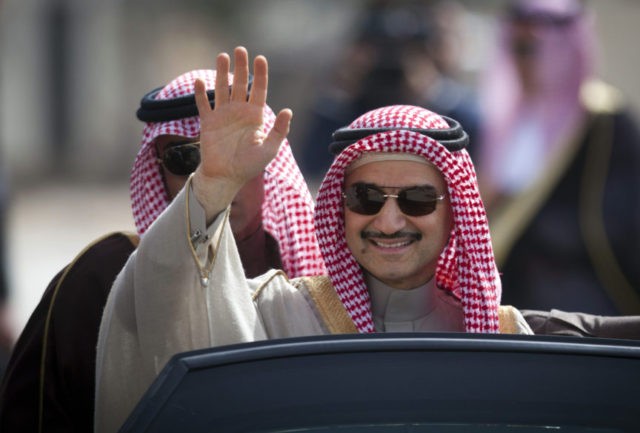Prince Alwaleed bin Talal, perhaps the highest-profile member of the Saudi royal family detained during Crown Prince Mohammed bin Salman’s anti-corruption crackdown, has finally been released after reaching an unspecified financial settlement with the Saudi government.
Sources told AFP that Alwaleed was released on Saturday, the day after another high-level detainee was freed, media tycoon Waleed al-Ibrahim. A party was held after Ibrahim’s release and a congratulatory email sent to his employees. Left unresolved for the moment was whether control of his MBC satellite network was handed over to the government as part of his settlement.
In Alwaleed’s case, AFP’s sources said he would “for sure” be allowed to remain as head of his massive Kingdom Holding Company. Speculation about the fate of his company was making investors around the world nervous as his detention dragged on.
Given that the stated purpose of the anti-corruption crackdown was to make the Saudi economy more stable, efficient, and attractive to investors, Alwaleed might have been using market jitters and pressure from the global investment community to bargain his settlement down. Some of the other detainees are said to have paid over a billion dollars each to secure their freedom. The UK Daily Mail notes that Saudi officials at one point ordered Prince Alwaleed to pay at least $6 billion to secure his freedom, and mentioned allegations of money laundering, bribery, and extortion. His overall net worth has been estimated at $17 billion.
Kingdom Holding shares jumped 10 percent immediately upon news of Alwaleed’s release, even though the overall Saudi stock market was flat.
The New York Times reports that, just before he was released, Alwaleed gave a videotaped tour of the Riyadh Ritz-Carlton hotel suite where he had been imprisoned. This was evidently intended to reassure the public that his detention was comfortable, contrary to rumors that some of the detainees were physically abused. Saudi officials reportedly arranged pre-release interviews for Alwaleed expressly to counter accusations that he had been spirited away to a much less comfortable detention facility and physically abused.
Some footage from the video tour, courtesy of the BBC:
The NYT notes that Alwaleed was visibly “thinner,” wore a “scruffy salt-and-pepper beard,” and kept his sunglasses on in the video. On the other hand, he gave a pre-release interview to Reuters in which he insisted his detention was a “misunderstanding,” expressed support for Crown Prince Mohammed’s reforms, and said he felt perfectly “comfortable” and “relaxed” during his detention. In fact, he portrayed his time at the Ritz-Carlton as an extended consultation with the authorities, rather than detention under threat of criminal charges, and said he would have been happy to extend his 80-day stay even longer if needed.
That is a bit difficult to square with the New York Times’ description of conditions for “guests” at the hotel after it was pressed into service as a detention center:
Each got his own room, but had to leave the door open, with guards posted outside. The detainees could order room service and watch TV, but they had no phones or internet, to prevent appeals for help. The rooms were still lavish, but their curtain cords and glass shower doors had been removed to prevent suicide attempts. They were not allowed to summon lawyers, who might have been able to help, and many succumbed to being stripped of their substantial assets.
Many of the detainees were overweight or had health problems, and some were in their 70s, so a doctor noted their medical needs. Since none had packed for an extended stay, a tailor came, took their measurements and soon brought them new outfits.
Prince Alwaleed’s release has been widely interpreted as a sign that the anti-corruption crackdown is winding down, which would imply his extended detention was vital to maintaining the legitimacy of the operation and keeping the pressure on other detainees; he simply had to be among the last to check out of the Ritz-Carlton.
The New York Times mentions another rumor about Alwaleed’s detention: he took a huge loan from the monarchy after the 2008 financial crisis hammered his investments and did not fully repay it, so his detention was essentially one of the toughest debt collection efforts in history.

COMMENTS
Please let us know if you're having issues with commenting.